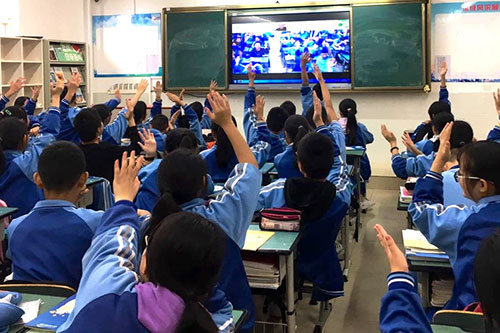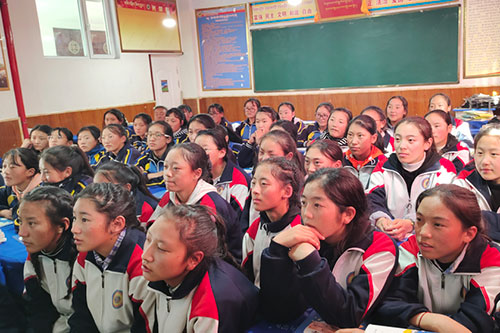News
Adolescents with questions find answers via live-streamed sexuality education in China
- 28 December 2021
News
QINGHAI PROVINCE, China – “I never talked about sex with my friends or my parents,” said 15-year-old Cairen, a 9th-grader in China’s Qinghai Province. “Sexuality is a taboo topic.”
Her experience is shared by many adolescents across China as they struggle to negotiate the transition to adulthood. In Yunnan Province, 14-year-old Tu confided, that once in a while, he would talk with his friends about sex. But after a word or two, “the conversation was over.”
Beneath the silence, however, questions about sexuality and relationships kept bubbling up for both Cairen and Tu, and for many of their friends. Tu wanted to know how to avoid getting HIV. Cairen felt she needed to understand more about menstruation.
Offered a chance to learn more, they jumped at it.
Both took part in an innovative eight-session live-streamed course on comprehensive sexuality education. Developed by UNFPA in partnership with Marie Stopes International, the course covers a range of topics that adolescents everywhere want to know about, like how reproduction works, how to use contraception, how to say no to a relationship and what it means if you feel attracted to someone who is the same sex.

“All our questions got answered,” affirmed Cairen. She especially appreciated that the course was online since “it’s not so embarrassing when the instructor is on a screen.”
Despite its rapid development, China, like many countries, has not kept up when it comes to providing adolescents with accurate, comprehensive information about sexual and reproductive health and rights. Taboos around speaking openly about these issues are persistent, with consequences including high rates of unintended pregnancies, abortions, HIV and sexually transmitted infections.
Knowledge gaps also reinforce gender inequality. Girls who are unaware of their rights are vulnerable to becoming trapped in abusive relationships, for example. Young people without accurate information about their bodies risk unintended pregnancy.
Some of the most acute disparities in information access have been in rural areas, like the places where Cairen and Tu live. But UNFPA saw an opportunity in China’s rapid modernization of rural schools. A drive to make online learning more common was well underway even before COVID-19, and it has since accelerated.
This made it possible to consider a live-streamed course that could reach remote areas and deliver high-quality materials. It built on a model originally designed and tested by young innovators at a UNFPA Innovation Boot Camp in Germany. The project was subsequently selected for implementation under a global innovation challenge sponsored by UNFPA’s Innovation Fund, becoming part of an organization-wide drive to rethink ways to reach youth and end unmet need for family planning.

But the programme was not simply deployed into China. Instead, it was carefully adapted to accommodate local social dynamics in China, with in-depth consultations with school principals, teachers and students. This resulted in a medically accurate, locally acceptable, culturally sensitive, human rights-based course on comprehensive sexuality education. It is the first of its kind in China, adhering to international standards grounded in robust research. The course puts a central emphasis on encouraging gender equality and the development of relevant practical skills, such as communication..
An initial pilot in 2020 involved over 400 middle school students in three provinces in Western China. Students who took the course reported immediate gains in knowledge and confidence about their bodies and choices.
One eighth-grade girl expressed her relief in finally having an alternative to information online. “A lot of the information on the Internet is negative,” she said. “In the class, the tutor would tell us what kind of knowledge is appropriate for what age… [based on] a scientifically reliable standard.”
Teachers have also embraced the course. As a biology teacher, Xinzhi Hu had previously struggled with the gap in sexuality education and attempted to teach the subject on her own.
She welcomed the chance to start answering questions that will empower her students now and throughout their lives. “I want to see sexuality education in every school in China,” she commented. The reason is simple: “It works.”